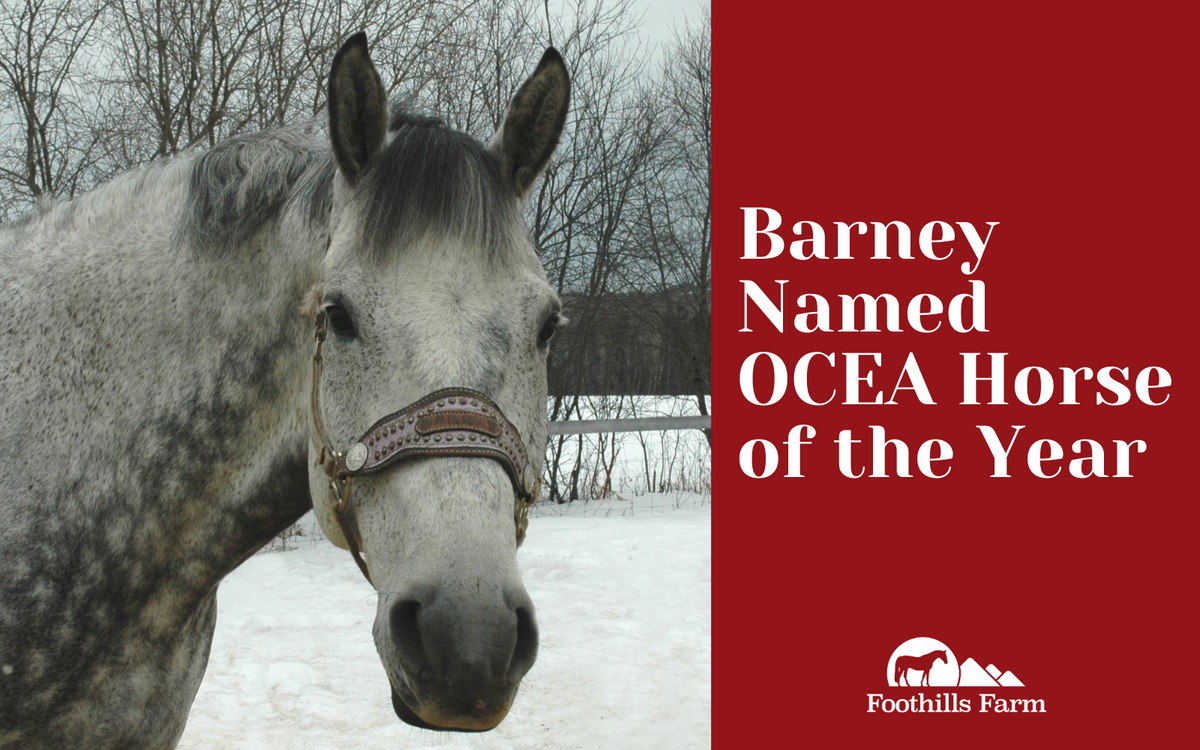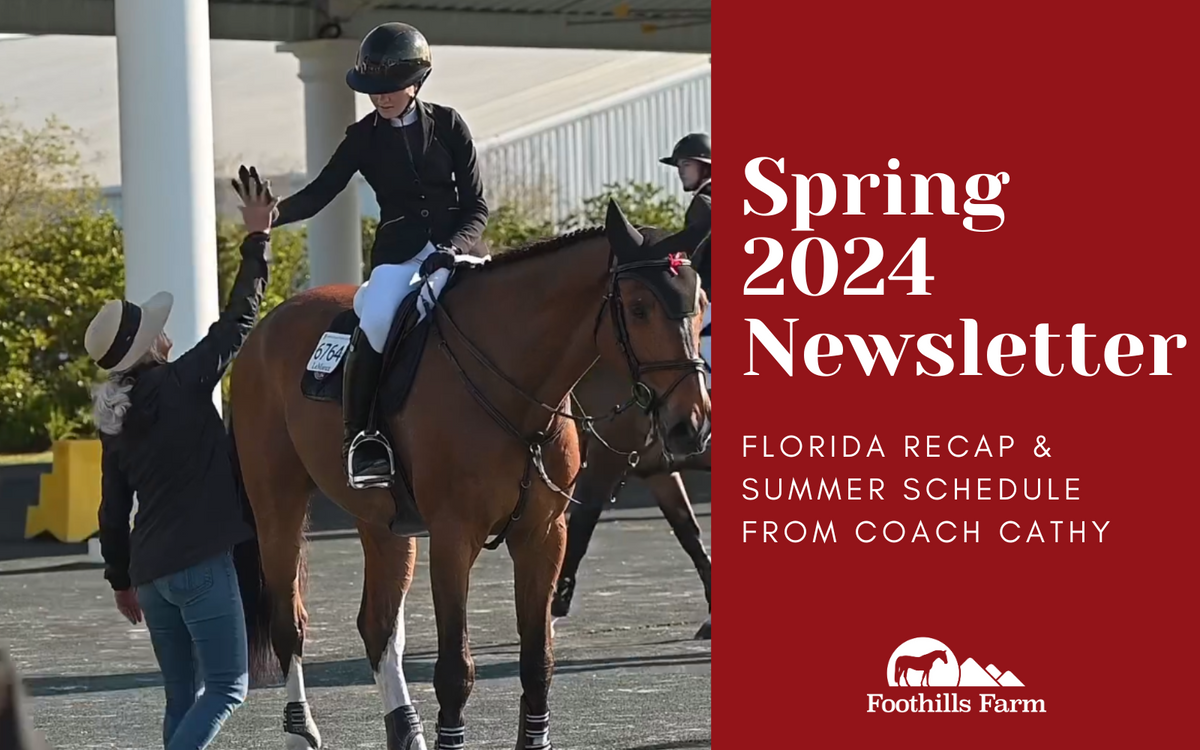Horse Mouth Health - A Chat with Mike Lawrence

Mike Lawrence grew up riding and showing horses in Nova Scotia but it was when he was competing in the Eastern United States with his sister and brother-in-law where he discovered a secret - regular maintenance of teeth could help improve a horse’s performance under saddle and in competition. After attending an equine dentistry school in Nebraska, Mike decided to become an equine dental practitioner.
On his latest visit to Foothills Farm, we sat down to get the facts about mouth care - straight from the horse’s mouth!
Improvement to Performance
Dentistry for horses may solve performance problems such as turning issues, contact issues and improve the general comfort for your horse.
“I work in conjunction with the horse’s veterinarians, farriers, body workers, trainers and riders, we are each just one part of the team. At Foothills I am fortunate to work with very good people and they have a very knowledgeable and skilled rider in Cathy Inch and an organized manager in Laurel Scott to provide some history. I also have the pleasure of working with their veterinarian Dr. Marcie Ninness who does chiropractic work as well which I think is great. A balanced mouth combined with good body work really helps make horses feel more comfortable. When a horse is uncomfortable they can't perform at their peak, being in discomfort is something that can keep a horse from reaching their full potential.”
Dr. Ninness and Dr. Manning also are experienced at providing dental maintenance and also work on the horses as Mike only comes to Foothills once a year. On this day Marcie is in charge of administering sedation and providing the history of the issues her horse clients are experiencing. Once that is done Mike goes to work.
“The goal of equine dental maintenance is to maximize the amount of chewing surface for the horse by reducing protuberances without narrowing the occlusal tables. I focus my services on equilibration, removing enamel points, optimizing table angles and distributing the contact so there isn’t unequal pressure on any individual tooth. This must be done without disrupting the health of the individual tooth and with not removing excess tooth material. When the horse’s mechanical chewing function is improved then often some secondary issues the horse is having may resolve also.”
Mike suggests that every horse should get routine maintenance done every 6 months or at least every year depending on the age of the horse. For younger horses, he suggests that they get looked at every 6 months because their teeth can change a lot at early stages and you are more limited in how much tooth material you can reduce in a younger horse when doing maintenance.
Bits
Work with your coach to ensure that you find the right bit that suits your horse.

A bit that might be nice for your coach to ride your horse in might be a different bit than you should ride your horse in.
Mike suggests to consider some things when choosing a bit:
- Fat bits. They often don’t leave enough room in the horse’s mouth to be comfortable with a nose band so he doesn’t feel that a fatter bit is necessarily softer.
- Gimmick bits. It may suit one horse but due to the variety of mouth shapes they likely won’t properly fit many horses in your barn.
- Single jointed bit. If your horse has a low palate then a single jointed bit may be uncomfortable for them because it may irritate the roof of their mouth when the rider takes contact.
- Avoid an Ill fitting and overly severe bit that is too severe for the rider’s experience level.
“I personally prefer to see that riders get away with less bit, especially unsophisticated riders. If the horse is strong, you shouldn’t just automatically go to a bit which is the next level of severity. Instead look at the shape of the bit and see if it fits the horse’s mouth properly. Often the horse is being difficult in the mouth because they are uncomfortable and you can get away with a less severe bit if it is better suited to their mouth conformation. Horses tend to lean and get heavy with bits that cause them discomfort, alternatively they may be too light and not want to stay on the contact. You need to be aware and sensitive to your horse’s mouth conformation. A more comfortable horse is a happier horse and general a more pleasant horse to ride."
Bits have an impact on teeth. Depending on the length of the mouth, some bits actually can touch the first molar. Also, when you take contact with the bit, especially when using leverage bits, 3 ring bits and some pelhams, it can pull the lips into the teeth and their lips can possibly get pinched. If there is pinching then sometimes the tooth needs to be tapered to stop the pinching. Finding a comfortable bit and having regular mouth maintenance is important especially when leverage bits that put pressure on the tissue at the side of the mouth are used.
Part of the team
Make an effort to know your horse and know what is normally behaviour. If there is anything out of the ordinary, you should work with your vet to determine whether their teeth might be the primary cause. Some signs to watch for:
- Abnormal riding behaviors
- Change in eating habits
- Sensitivity
- Turning issues
“Good, responsible horse care involves using the whole team, having a healthy relationship with all partners and ensuring that information is shared so everyone can have the whole picture when providing treatment.”.
Also in Blog

Barney Named North Zone Horse of the Year by OCEA
Foothills Farm is thrilled to announce that Barney has been named the North Zone Horse of the Year at the Ontario Collegiate Equestrian Association (OCEA) Year-End Banquet!




